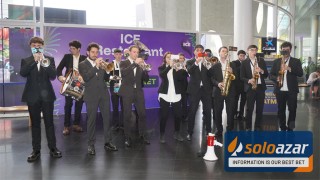New Jersey Study: Problem gambling rate dropped, but still higher than U.S. average
Friday 29 de September 2023 / 12:00
2 minutos de lectura
(New Jersey).- High-risk problem gambling in New Jersey fell over 11% from 2017 to 2021, according to a Rutgers University study, although the percentage of adults estimated to have problem gambling issues — 5.6% — remains roughly triple the national average.

These figures, along with hundreds more, were released Thursday in the Rutgers Center for Gambling Studies report, which was funded by the New Jersey Division of Gaming Enforcement to update previous findings released in 2017.
“As New Jersey’s gaming industry continues to grow, we have an obligation to help those suffering from problem gaming and gambling addiction issues,” Attorney General Matthew Platkin said in a press release announcing the report. “Through the release of this report, we are taking a comprehensive look at the pervasiveness of gambling across the state, and with it, able to better identify challenges for our most vulnerable populations and design programs and initiatives to assist them.”
Among highlights from the report, which was based on surveys conducted between December 2020 and April 2021 of 3,512 New Jerseyans age 18 and older:
- Nearly 20% of the state’s adults placed a bet on sports, up from 15% in 2017. Participation in sports wagering increased from about 15% to a little more than 19%.
- People who gamble only online tripled to 15%, while people who say they gamble both online and in person nearly doubled to 36%.
- More than six in 10 New Jersey adults participate in at least one form of gambling, and people who self-identified as “gamblers” participated in an average of 3.5 activities, up from 3.0 in the 2017 report.
“We are dedicated to helping players play responsibly,” said David Rebuck, director of the state Division of Gaming Enforcement. “For some people, this means setting limits to keep the experience enjoyable and social. For others who are struggling with problem gambling, it may mean signing up for self-exclusion or seeking out additional resources. We encourage both players and operators to maintain a balanced perspective on gambling.”
Other findings
- The two most popular forms of gambling were the purchase of lottery tickets (73% of residents) and scratch-off lottery tickets (59.1%), but both those figures were down from 2017. Lottery ticket buyers were down 7%, scratch-off buyers down 5%.
- Nearly 25% of respondents said they engaged in high-risk stock trading, a seven-fold increase from 2017.
Age and gender
- Men had double the rate of problem gambling.
- Nearly 70% of respondents aged 45-54 reported gambling in the past year, which was the most of any age cohort.
- One-third of gamblers ages 18 to 24 reported gambling only online, the highest of any age group and five times as many as in the last survey.
- Almost 20% of 18-to-24-year-olds were reported to be “at-risk” of problem gambling behaviors.
Money and types
- People with annual income between $125,000 and $150,000 were most likely to gamble, at 73%.
- More than 14% of people in households making less than $15,000 a year were high-risk problem gamblers, a finding particularly notable in that only half of that economic cohort reports gambling at all.
- High-frequency bettors (people who bet once or more a week) preferred season-long sports, daily fantasy sports, and sports betting more than low and medium-frequency gamblers.
Problem gambling
- Nearly 20% of respondents reported some level of a gambling problem.
- Black/African Americans had the highest rate of high-risk problem gambling at nearly 16%.
- People who gambled were significantly more likely than non-gamblers to use tobacco, alcohol, and illicit drugs.
- About 28% of high-risk problem gamblers reported having thoughts of suicide, and 20% said they had made an attempt.
Over 1,500 people were interviewed via phone for the study, and an additional 2,000 via online methods.
Categoría:Others
Tags: Sin tags
País: United States
Región: North America
Event
ICE Barcelona 2026
19 de January 2026
Darío Zutel talks all about Win Systems' presence at ICE Barcelona 2026
(Barcelona, SoloAzar Exclusive).- Darío Zutel, Executive Chairman of Win Systems, reviews the results achieved at ICE Barcelona 2026, highlights the strategic quality of the contacts generated, the momentum of cashless solutions with WIN PAY, and outlines the company's innovation and expansion plans across the Americas, Europe, and other key international markets.
Monday 09 Feb 2026 / 12:00
Air Dice at ICE Barcelona 2026: Building Momentum Through Innovation and Strategic Market Expansion
(Barcelona, SoloAzar Exclusive).- In this interview, Erkki Nikunen, Partner & CBDO of Air Dice, reflects on the company’s performance at ICE Barcelona 2026, the strong reception of its FateQuest series, key industry trends shaping the sector, and Air Dice’s strategic priorities for growth, partnerships, and market expansion in 2026.
Monday 09 Feb 2026 / 12:00
Merkur Group Shines in Barcelona with Triple ICE Triumph
(Espelkamp/Barcelona).- Merkur Group secures three prestigious international accolades for operational excellence, social commitment, and standout exhibition experience.
Friday 06 Feb 2026 / 12:00
SUSCRIBIRSE
Para suscribirse a nuestro newsletter, complete sus datos
Reciba todo el contenido más reciente en su correo electrónico varias veces al mes.



















